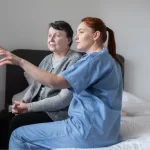
Hello there! We know that finding the right home care for your loved ones can be a bit overwhelming, especially with all the options available. That’s why we want to help you understand the difference between medical and non-medical home care, so you can make the best decision for your family. In this article, we’ll explore the essential aspects of each type of care and how they can benefit your loved ones.
Medical Home Care: What Does It Involve?
First, let’s talk about medical home care. This type of care is designed for seniors who require ongoing medical attention due to chronic illnesses, injuries, or other health conditions. Medical home care is provided by healthcare professionals, such as registered nurses (RNs), licensed practical nurses (LPNs), private nurses, physiotherapists or other certified medical personnel. These professionals are trained to administer medications, monitor vital signs, manage wound care, and perform other essential medical tasks.
Some of the services provided under medical home care include:
1. Medication Management:
Ensuring that your loved one takes their medications on time and in the correct dosage.
2. Wound Care:
Tending to any wounds, such as surgical incisions or pressure ulcers, and providing the necessary treatment.
3. Physical Therapy:
Assisting with exercises and mobility to help improve strength, flexibility, and overall functionality.
4. Monitoring Vital Signs:
Keeping an eye on blood pressure, heart rate, and other essential indicators to prevent complications and ensure proper treatment.
5. Chronic Disease Management:
Providing specialized care and support for conditions such as diabetes or heart disease.
6. Catheter or Colostomy Care:
Involves regular cleaning of the catheter and drainage bag, securing the catheter, and monitoring for any signs of infection.
7. Rehabilitation Services:
Following a stroke or injury, some seniors may require specialized therapies, such as physical or occupational therapy, to help them regain their abilities.
8. Palliative Care:
For those with terminal illnesses, home medical care can provide comfort and symptom management to improve their quality of life.
Non-Medical Home Care: How Does It Differ?
Non-medical home care focuses on providing assistance with daily living activities and companionship, rather than medical treatment. This type of care is typically provided by personal support workers, home health aides, or caregivers who have undergone specialized training.
Non-medical home care is ideal for seniors or individuals who need help with daily activities but don’t require specialized medical care. This type of care can provide peace of mind for family members who may not have the time or resources to provide the necessary support themselves. It can also help to promote independence and improve the overall quality of life for the individual receiving care.
Services under non-medical home care include:
1. Assistance with daily living activities:
If your loved one is struggling to manage tasks like cooking, bathing, or getting dressed, non-medical home care can provide the support they need.
2. Dementia or Alzheimer’s care:
Seniors with cognitive impairments often require specialized care, including assistance with daily tasks, medication reminders, and engaging activities to stimulate their minds.
3. Respite care:
Family caregivers often need a break from their caregiving duties, and non-medical home care can provide temporary relief, allowing them to recharge and avoid caregiver burnout.
4. Companionship:
Loneliness can have a significant impact on seniors’ mental health, and non-medical home care can provide much-needed social interaction, conversation, and emotional support.
5. Mobility assistance:
Helping seniors move safely around their home, reducing the risk of falls or injuries.
6. Errand services:
Running errands on behalf of seniors, such as grocery shopping, picking up prescriptions, or mailing packages.
7. Cognitive stimulation:
Engaging seniors in activities that promote mental well-being, such as memory games, puzzles, or discussions on current events.
8. Exercise support:
Encouraging and assisting seniors in light physical activities, such as walks or gentle stretching, to promote overall health and well-being.
How to Choose the Right Type of Care for Your Loved One
So, how do you determine which type of home care is the best fit for your loved one? Start by assessing their needs and considering factors like their current health conditions, mobility, and level of independence. It’s also essential to discuss their preferences and involve them in the decision-making process whenever possible.
Remember, it’s not uncommon for seniors to require a combination of both medical and non-medical home care services. For example, a senior recovering from surgery might need medical attention from a nurse during the initial stages of recovery, while also benefiting from non-medical support for daily living activities.
Here are some questions to ask yourself as you make this important decision:
What level of care does my loved one need?
If they require medical assistance, monitoring, or therapy, medical home care may be the best option. If they need help with daily living activities or companionship, non-medical home care might be more suitable.
What is the current living situation?
Consider the accessibility and safety of the home environment. If there are concerns about the home’s suitability for providing care, it might be worth exploring other options such as assisted living or long-term care facilities.
What is the budget?
Home medical care can be more expensive due to the specialized nature of the services provided. Be sure to explore any financial assistance or insurance coverage options that may be available.
What are the preferences of my loved one?
It’s essential to involve your loved one in the decision-making process to ensure that their needs and preferences are being met.
Conclusion
Remember, whether you choose medical or non-medical home care, the goal is to provide your loved ones with the support and care they need to maintain their quality of life and independence. It’s essential to keep an open line of communication with your loved one and their caregiver to ensure that their needs are being met and that everyone is comfortable with the arrangement.
As you navigate at home senior care options, it’s essential to find home care providers that offers a comprehensive range of services tailored to your loved one’s unique needs. Agile Healthcare Solutions is proud to serve families in the Greater Toronto Area by providing both medical and non-medical home care services. Our medical home care services include in-home nursing, palliative care, around-the-clock nursing care, care after surgery or hospitalization and more. Our dedicated team of licensed healthcare professionals is ready to provide the necessary medical support and expertise your loved one needs.
In addition, we offer non-medical home care services to assist with various daily living activities and specialized care. Our offerings include dementia care, personal care, homemaking, in-home cooking for the elderly, senior companionship care and more. Our compassionate caregivers are committed to enhancing the quality of life for seniors and their families.
As you consider your options, remember that there are dedicated professionals who can provide guidance and support throughout the process. At Agile Healthcare Solutions, we understand the importance of finding the right care for your loved one. Our team of compassionate, experienced caregivers is ready to help you make an informed decision and provide the personalized care your family deserves.
Feel free to reach out to us if you have any questions or need assistance in choosing the best at home senior care option for your loved one. Our friendly and knowledgeable staff is always here to help. And remember, we’re just a casual conversation away!
At the end of the day, we want you to feel confident and reassured that you’ve made the best decision for your loved one’s well-being. When you know the difference between medical and non-medical home care, you can feel empowered to make the right choice for your family’s unique needs. With the support of a reliable and compassionate caregiver, your loved one can continue to thrive in the comfort of their own home.













